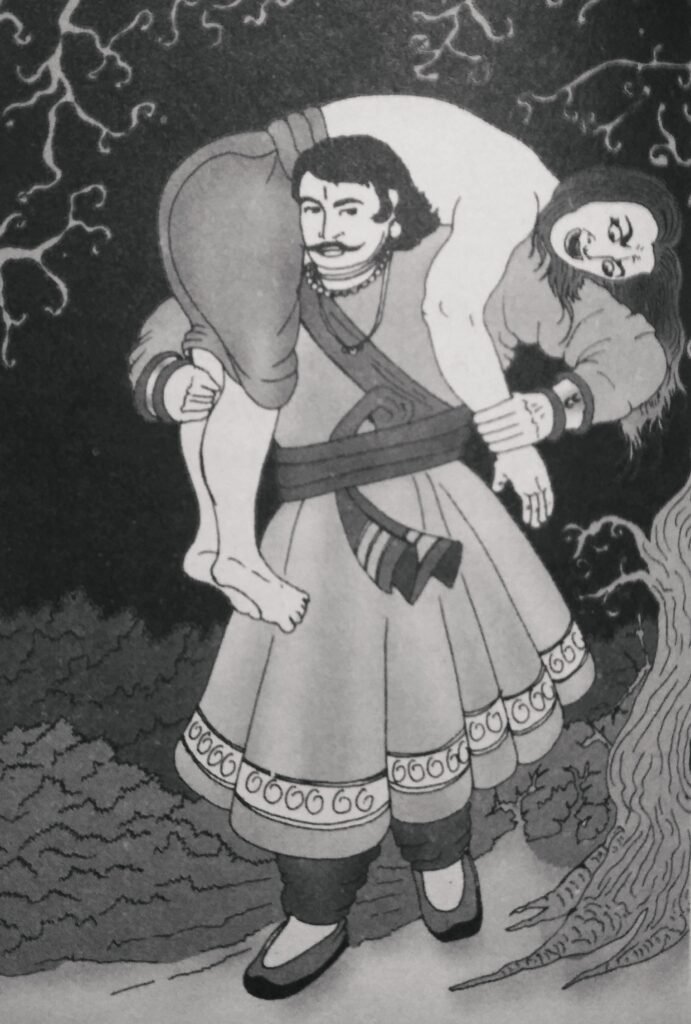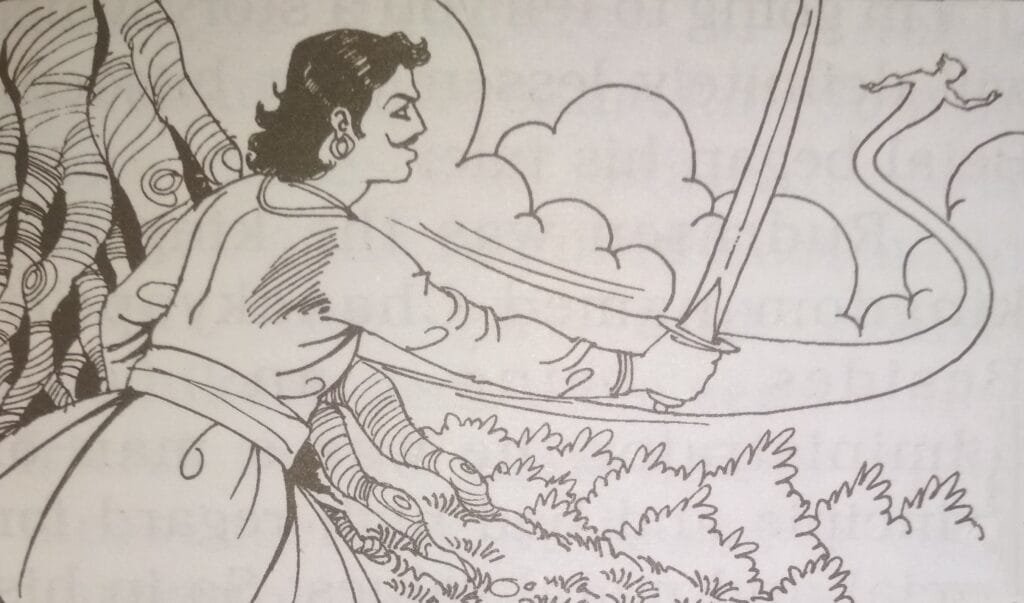King Vikramaditya could not catch Betal on the way. When he reached the peepal tree while chasing him, he found the corpse hanging from the branch. The king was weary but was determined to keep his promise to the hermit. He pulled the corpse onto his shoulder and began walking towards the crematorium.
After a little time, Betal said to the king, “Vikram, I know you are tired and annoyed by my repeated escapes. But I have my own queries regarding our lives, and none other than you can provide answers to my questions. Until I get all the answers to my questions, you will have to face my escapes. I assure you that the moment I finish all my questions through the stories, I’ll accompany you.”
The king heard him but did not say anything. Betal said, “Vikram, listen to another story of mine which will certainly lessen your burden.”

Betal began his tale:
In ancient times, there was a Vanga Kingdom in the Ganges delta, which included the Sundarbans. The kingdom was ruled by a brave, handsome king named Deva. The king had a pet parrot named Popatlal. Popatlal was no ordinary parrot. He had traveled far and wide, coming across different people from different kingdoms and gathering valuable information.
Popatlal was not just a bird to the king; he was also a great companion and adviser. One day, King Deva asked, “Popatlal, you have seen many princesses. Can you suggest a suitable bride for me?”
The parrot Popatlal said, “O king, Paro, the princess of Roop Nagar, is the symbol of beauty, grace, and virtue. She will be the most suitable bride for you.”

King Deva liked his advice and sent a marriage proposal to Princess Paro. Paro was indeed a woman of substance and beauty. Strangely enough, she too had a pet bird (Mynah) named Maina, who was a great companion to the princess. Maina had also traveled to many places, and she knew about King Deva very well.

Before the marriage proposal arrived for Princess Paro, Maina had spoken highly of King Deva’s bravery and charm. So when the marriage proposal came to Princess Paro, she readily agreed to marry Deva. Soon, they were married amidst big celebrations. After marriage, Maina (Mynah) too found a companion in the parrot, Popatlal. They often talked to each other for a long time. One day, Maina said, “Popatlal, today I am going to tell you a very interesting story. Listen carefully.”

Maina began her tale:
Once upon a time in a certain city, there lived a wealthy businessman named Manilal. The man had a beautiful young daughter named Apsara. She was a fickle-minded young woman who could lose her heart to any handsome man. The father was aware of her behavior and tendencies. So without delaying much, the businessman found a groom from a respected and god-fearing family and married her off. Apsara, the girl, went away with her husband Devdas, but the change in place did not really change her.

Shortly after her marriage, one of her father’s employees came to meet her. The man was one among those to whom she had lost her heart in the past. When the man came to Apsara’s place, her husband Devdas was out for his day’s work. The man was willing to extend his past relationship with her. Apsara was no longer interested in him, but she was frightened that he might disclose their former relationship to her husband. So instead of saying no to him, she talked to him nicely for some time and then served a glass of juice to him. She wanted to get rid of him, so she secretly mixed poison in the juice. The man, who could not guess her intention, drank the juice and died. Apsara had removed the man from her path, but another problem arose. She had to protect herself from the crime she committed. She dragged the dead body to a remote dark corner of the house and hid it there.

In the evening, when her husband Devdas came back from work, Apsara appeared calm and talked normally. After dinner, when it was time to sleep, she suddenly began screaming and shouting loudly. Her husband was astonished by her behavior. Before he could understand anything, the neighbors gathered to hear the commotion. Apsara was wailing and crying at the top of her voice. She had dragged the dead body out and was alleging that her husband had killed her father’s employee. The husband was aghast to hear his wife’s lie. Whatever Devdas said in his defense, no one believed him since his wife herself was accusing him of being the culprit. The king’s guards were called, and the next day he was produced before King Jagat Singh. Hearing the wife’s charges, the king too held the husband responsible for the man’s murder and sentenced him to death.

However, the day on which Devdas was to be hanged, a thief came into the court of King Jagat Singh. He said, “Your Majesty, I am a thief. I have come here to speak about the death sentence you have given to the man.”
The King Jagat Singh was curious and asked him to go ahead. The thief said, “Your Majesty, the man who is going to be hanged is innocent. The culprit is his wife. On that fateful night, I had gone to her house to steal. While hiding in her house, I witnessed everything.”

The thief told the king everything that happened that night. Hearing him, King Jagat Singh at once asked his guards to release the husband and to hang his wife in his place.
Betal completed his story and asked, “Vikram, who was the true culprit behind all the unfortunate incidents?”
Dear Readers, who do you think was the real culprit behind all the unfortunate incidents? Choose your answer before reading King Vikramaditya’s reply.

The king thought for a while and then said, “The businessman Manilal, the father of Apsara, was actually responsible for the misfortune that befell them all. Primarily, because he could not instill strong values in his daughter and secondly, because he hid the truth from her husband before her marriage. Had he told her husband about her nature, the girl would not have had to hide anything from her husband, leading to destruction.”
Betal was satisfied with the answer. He said, “But Vikram, I’ll have to leave, as you could not remain quiet.”
Saying so, Betal flew into the sky, while the king chased him desperately.

- 14 Best Panchatantra stories in hindi
- 15 Best Children Stories in English from Panchatantra 2.0
- 16 Best Aesop's Fables in Hindi with moral lessons
- 17 Best Aesop's Fables with moral lessons for children
- Arabian Nights
- Author's Best Written Stories in English
- Author's Best Written Stories in Hindi
- Baital Pachisi बैताल पचीसी in Hindi
- Bedtime Stories for All
- Hindi Love Stories
- Love and Romance
- Vikram and Betal series: Riddle Solving Stories
You can join my WhatsApp Channel by clicking the link here



